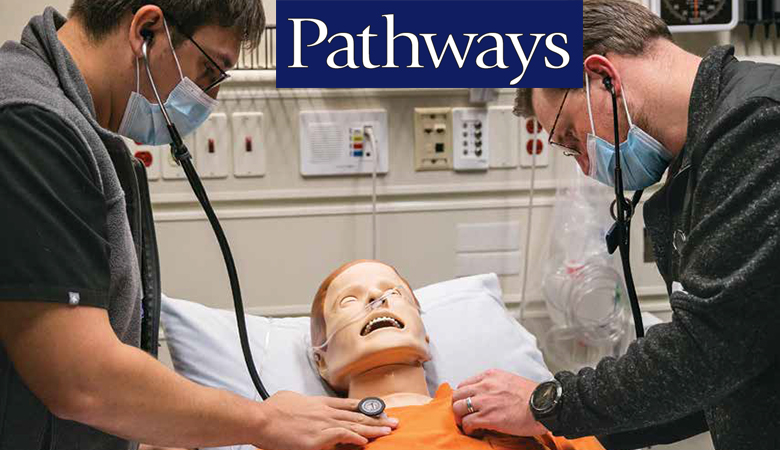Pathways: 13 Residencies + 9 Fellowships = Graduate Medical Education in Peoria

Graduate Medical Education, or GME, is a clinical education and training program for physicians who have completed their medical school requirements and been awarded an MD, or equivalent, degree. Part of UICOMP’s educational mission is its GME program. In Peoria, UICOMP is the sponsoring institution of 13 residency and nine fellowship training programs approved by the Accreditation Council for Graduate Medical Education as well as four additional non-accredited fellowships. The GME programs are offered in collaboration with OSF Saint Francis Medical Center and UnityPoint Health Methodist. Both healthcare affiliates serve as clinical sites for the GME programs.
Leaders at both OSF HealthCare and UnityPoint Health say GME is critical to their mission.
Samer Sader, MD, (UICOMP Class of 2000) chief medical officer at UnityPoint Health Methodist, says providing health-care requires training the next generation of physicians. “We know the odds of retaining physicians increases significantly when they have connections to our region,” Sader says. “Clinicians and physicians are teachers at heart. Our fondness to teach can be expressed in many ways, and education of patients and the community is the one that our neighbors see on a daily basis. The part that our neighbors don’t see as often is the education provided to trainees. The option to educate the next generation is attractive to many physicians within our system, and it helps us recruit and retain quality individuals in our system.”
Robert Sparrow, MD, (UICOMP Class of 1979) chief medical officer at OSF HealthCare Saint Francis Medical Center agrees. “Graduate Medical Education raises the level of care we’re able to provide and allows us to bring in faculty members who are highly educated, highly trained, and highly motivated,” Sparrow says. “GME is a pipeline to providers who bring quality healthcare to our community.”
Physician faculty are committed to current knowledge and trends, and Sader says that creates an inherent need to stay up-to-date. “Teaching also tends to improve communication skills,” he says. “The result for patients is improved care. GME ultimately allows for the training of physicians that will likely care for current and future patients. As a community, we are blessed to have UICOMP leading a strong commitment to education. At the end of the day, this will be critical to the healthcare needs in central Illinois.”
GME training equates to good healthcare for Peoria, but the relationship is symbiotic in that Peoria is an ideal location for future physicians to train, Sparrow says. “Coming to Peoria for training is an opportunity to have outstanding clinical training based on the volume and breadth of cases,” he says. “Residents receive dedicated, one-on-one training with faculty mentors and have access to research projects that they may not have at a large scale academic medical center. Here, residents learn side-by-side with faculty mentors and have outstanding training opportunities.”
Francis McBee Orzulak, associate dean for Graduate Medical Education, sees opportunity for expansion of GME programs. “We continue to explore opportunities for expansion of GME programs in partnership with our clinical affiliates,” he says. “When assessing a possible new program, we look at a variety of factors including the healthcare needs of the community we serve, need for practitioners of the specialty, and ensuring that we have the faculty and clinical experiences necessary to train in the specialty, just to name a few.”
This article is part of the Winter 2021-22 edition of Pathways. Read the full issue.